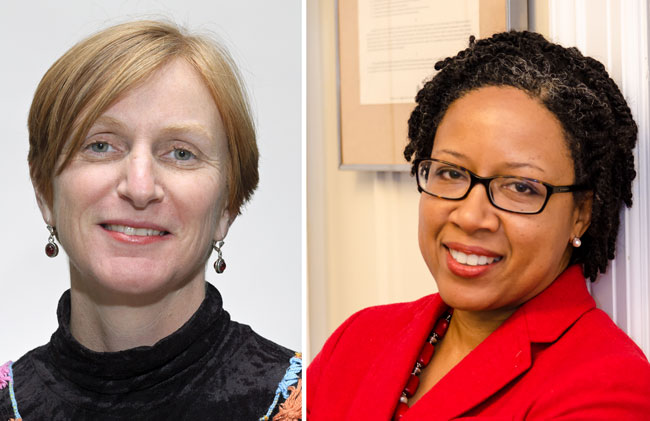
Proposed projects engage with Indigenous communities’ roles in climate change mitigation and new approaches to international labour law
By Kathryn Jezer-Morton
McGill researchers have garnered two of this year’s five Trudeau Fellows. Catherine Potvin of the Department of Biology, Faculty of Science and Adelle Blackett of the Faculty of Law will each receive a total of $225,000 over the next three years to support innovative projects designed to address challenges facing both Canadian and global populations. Up to five Fellows are named each year.
This year marks the first time that two women have been named Trudeau Fellows from McGill. This year’s cohort of five Fellows is all women – also a first for the Trudeau Foundation.
Trudeau Fellowships are awarded by the Pierre Elliott Trudeau Foundation to individuals who set themselves apart through their research, creativity and their commitment to public issues of importance to Canada. Fellows enjoy unique access to the rich intellectual network of researchers and practitioners who have joined the Pierre Elliott Trudeau Foundation community before them – 63 fellows, 117 mentors, and 202 doctoral scholars over the past 14 years.
“We are grateful for the ongoing support that the Pierre Elliott Trudeau Foundation has shown for McGill researchers,” said Rosie Goldstein, Vice-Principal, Research and Innovation. “The ambitious projects that have grown out of these Fellowships over the past 14 years are a testament to both the vision of the Pierre Elliott Trudeau Foundation and the rigour and tenacity of the Fellows.”
Catherine Potvin: Incorporating Indigenous Practices Into a Low-Carbon Economy in Canada
Potvin is a biologist whose work has focused on forest ecosystems and tropical forest carbon stocks, with particular attention to the land-use decision-making processes of Indigenous groups. Recently, Potvin spearheaded the Sustainable Canada Dialogues, which brought together researchers from across disciplines and led to the development of a Canada Climate Action Plan recommending 10 policy orientations for launching Canada’s transition to a low-carbon economy.
Potvin’s Trudeau Fellowship project envisions ways in which Indigenous groups across Canada can influence and take part in the development of sustainable and low-carbon economies. The goal of her project is to bring Indigenous climate change and sustainability initiatives into policy conversations though a participatory process, and to establish a long-term basis for cultural exchange between Indigenous groups working on low-carbon initiatives and a community of scholars working on climate change mitigation.
“We’re documenting indigenous initiatives on climate change,” Potvin said. “There are some great things being done.” One such example is the Mesg’ig Ugju’s’n wind power initiative being undertaken by Mik’Maq communities in the Gaspé. The project’s goal is a wind farm with the capacity to power 30,000 homes, built by and in coordination with local First Nations.
“It’s really essential to recognize the leadership of Indigenous people in everything that has to do with sustainability, and in the ways that natural resources are used – we have so much to learn from them,” says Potvin. “This project hopes to help them in trying to break some of the racism of our institutions, and help them have their voices heard.”
Adelle Blackett: International Labour Law as Engine for Social Justice
As a legal scholar, Adelle Blackett’s work has focused on human rights and labour law both domestically and abroad. She spent three years as an international official at the International Labour Office (ILO), a specialized agency of the United Nations in Geneva, and spent seven years as a Quebec Human Rights and Youth Rights Commissioner. She has written extensively on the interface between human rights and transnational labour law.
Blackett’s Trudeau Fellowship will support a project that engages the legacy and future of the ILO, by hosting a high level symposium with leading international actors, academics and policy makers, and formulating recommendations about the future of international labour law. These recommendations will be based on a legal mapping of creative, contemporary cross-border uses of international labour law, produced under the auspices of Blackett’s Fellowship.
One of Blackett’s underlying goals with this project is to explain and underscore the role of the ILO – the UN’s oldest specialized agency that will celebrate its centenary in 2019. McGill and Canada hold a special role in the ILO’s history, as the agency temporary relocated to McGill campus during the Second World War. The ILO has established freedom of association, equality, and workplace safety norms that have become standards in labour laws around the world, and as it enters its second century, its officials are actively seeking input into the role it should occupy in its next chapter.
Blackett seeks to help develop a roadmap for the ILO’s second century through this project. “The contemporary global environment makes the ILO’s constitutional commitment to social justice in the world of work every bit as relevant as it was in the past,” she stated, adding that “it is both timely and important to take up the ILO’s invitation to offer careful, critical inputs on future prospects for international labour law.”
Nominations are open for 2017 Fellows
The Pierre Elliott Trudeau Foundation fellowships were established in 2003 to encourage original and innovative projects that would not necessarily receive support through traditional funding mechanisms. Fellows are nominated by their peers and selected by an independent panel. Fellows propose a collaborative project involving other Foundation fellows, mentors, and scholars. The call for nominations for the 2017 fellowships is open until Dec. 2, 2016.
Read today’s Trudeau Fellows announcement

Warmest Congratulations to Professor Blackett. These are achievements that continue to inspire us, Black lawyers and students, and Women-of-colour, and remind us, “Yes we can”, despite the obstacles, and challenges.